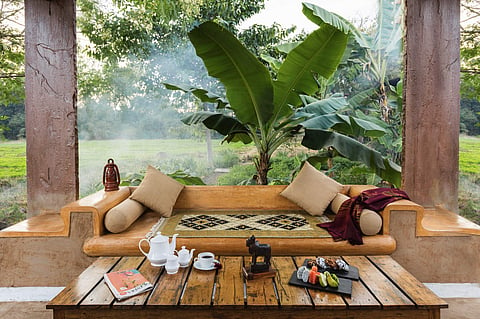
- LIFESTYLE
- FASHION
- FOOD
- ENTERTAINMENT
- EVENTS
- CULTURE
- VIDEOS
- WEB STORIES
- GALLERIES
- GADGETS
- CAR & BIKE
- SOCIETY
- TRAVEL
- NORTH EAST
- INDULGE CONNECT

The pandemic has put travel plans on hold across the globe. But it doesn't mean that you can't plan to travel in the future when things get back to the 'old normal' or if we just get used to the 'new normal.' Wondering how different your next vacation could be? Here's an idea: plan a sustainable food trail. This trail should include travel destinations that rely on homegrown and local produce.
As per the 2019 EAT-Lancet Commission, the world witnessed a shift towards more sustainable food systems, which essentially implies, people opted for locally grown vegetables, fruits, whole grains, and legumes. Many resorts across India have been self-reliant for ages, however, ever since the sustainable concept got highlighted globally, tourists have sought to holiday at such destinations. Whether you vacay in 2020 or post the pandemic, our compilation of luxe destinations in India that are taking the sustainable route will be a handy guide:
Glenburn Tea Estate, Darjeeling: This estate has boasts a legacy of working with the local community and celebrating their culture and traditions. Apart from the tea landscape, Glenburn also owns a vegetable and herb garden. The property also makes its own mulberry jam, orange and pomelo marmalade and other seasonal fruit preserves. The menu includes local fare, traditional Indian dishes, exotic South-East Asian delicacies, and a variety of European dishes all of which are cooked using fresh herbs, and salad leaves grown in the kitchen garden.
Tiger Mountain Pokhara Lodge, Pokhara, Nepal: Everything you eat here is made using local ingredients and in-house spice mixes. If you are seeking some authentic flavours, then you won't be disappointed. Ask for the chilli and Himalayan pink salt mix. This spice that is served in most Tharu homes is a mix of salt, red chilli, seared garlic and ginger that is ground together. Timur (Zanthoxylum armatum), sesame and other spices are used in cooking at the Tiger Mountain Pokhara Lodge that give its dishes a distinct flavour. The lodge owns a garden where they grown mainly herbs and greens for salads. They source local produce such as fresh meat, vegetables, buckwheat and millet flour, bran (for baking) and foraged items from Pokhara's local farmers. The tea is sourced from Guranse Tea Garden in eastern Nepal, Dhankuta district.
The Lodge at Wah, Palampur: The chefs here whip up some delectable meals using only locally sourced ingredients. The dishes highlight local flavours and are cooked using vegetables and herbs grown in their backyard. From thyme, rosemary, oregano, cilantro, chillies, red spinach, radish, carrots and peas to seasonal fruits, everything is grown at The Lodge at Wah.
Jehan Numa Retreat, Bhopal: This luxury resort has opened the Green House Bistro that's based on the farm to fork concept of the slow food movement. Almost 70 percent of the produce is grown on the property. The vast landscape of the resort is used to grow a number of vegetables, fruits, and herbs that are used for cooking. The Green House Bistro is built next to the vegetable farm where cabbage, cauliflower, beetroot, carrots, tomatoes, cherry tomatoes, eggplant, broccoli and kale are grown regularly. The resort also grows fruits such as bananas, papaya and pomegranate. Hherbs like sage, thyme, rosemary, kaffir lime and bayleaf too are grown in the vegetable garden. The produce is grown organically without using any chemicals or pesticides, instead the resort makes its own animal compost to keep the soil fertile.
Svasara Jungle Lodge, Tadoba: Sustainability practices include an emphasis on zero-waste at the Svasara Jungle Lodge. The chefs here cook as per daily requirements to avoid storage and potential wastage. The property also adopts grandmothers' wisdom of using ingredients without wasting any bit. For example, once lemon juice is extracted, the peel is used to make pickles and relishes. The lodge has adopted the practice of pre-planned weekly menus, which are designed keeping in mind the seasonal availability of raw produce.
Suryagarh, Jaisalmer: Over the years, Suryagarh resort has worked towards backward integration of the food supply chain. The property has invested in over 500 acres of its own farmlands that supplies grains and pulses. The crops are rain-fed and river-fed agriculture with no pesticides, insecticides, or inorganic fertilisers. Fertilisers and natural pesticides are cultured and prepared in decomposition pits at their farmlands and heirloom seeds are procured from local communities. The resort also owns over 60 Tharparkar cows (native species from Jaisalmer, known for A2 milk. They are free-range, and feed on many types of local grasses that they grow). Apart from these practices, the property houses organic gardens to procure fresh seasonal vegetables and herbs.
ayeshatabassum@newindianexpress.com
@aishatax